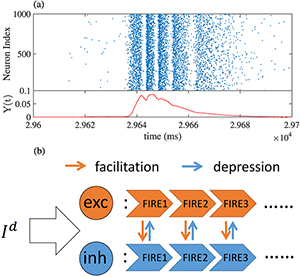EPJ B Highlight - Inhibitory neurons have two types of impact on brain oscillations
- Details
- Published on 28 May 2019

A certain type of neuron, called inhibitory neurons, can have two types of overall effect on oscillations in the brain
Studying the brain involves measuring the activity of billions of individual brain cells called neurons. Consequently, many brain measurement techniques produce data that is averaged to reflect the activity of large populations of these neurons. If all of the neurons are behaving differently, this will average out. But, when the behaviour of individual neurons is synchronized, it produces clearly visible oscillations.
Synchronisation is important to understanding how neurons behave, which is particularly relevant with regard to brain diseases like Alzheimer’s, epilepsy and Parkinson’s. Now, a group of researchers from the Institute of Computational Physics and Complex Systems at Lanzhou University, China, has used a combination of two computer models to study the ways different kinds of neurons can impact synchronisation. The study is published in the European Physical Journal B.
To study the effects on synchronisation, the authors examined neurons called inhibitory neurons – which work to slow down or stop the activity of other neurons. Moreover, they explored the likelihood of these inhibitory neurons firing either spontaneously or not at all within the network.
Using computer models, the researchers then constructed an Izhikevich neural network; they also employed a model of neuronal transmission, called the Tsodyks-Uziel-Markram (TUM) model.
Their findings indicate that inhibitory neurons can have a two-fold impact on oscillatory patterns. On the one hand, they can delay the firing of the neurons, which prevents synchronisation from happening. On the other, they can facilitate the transition of the oscillatory patterns, which is conducive to synchronisation.
The research is important for increasing our understanding of brain diseases, like stroke, Alzheimer's and epilepsy. "The ever-increasing morbidity of brain diseases makes the investigation on this topic significant in both psychology and medicine" the authors say.
Peng-Xiang Lin, Chong-Yang Wang and Zhi-Xi Wu (2019), Two-fold effects of inhibitory neurons on the onset of synchronization in Izhikevich neuronal networks, European Physical Journal B 92:113, DOI: 10.1140/epjb/e2019-100009-2




